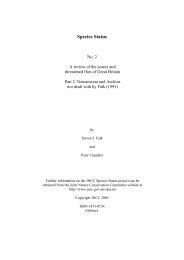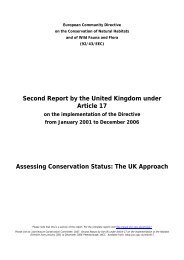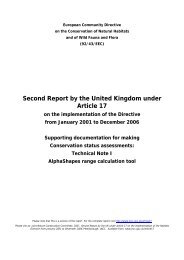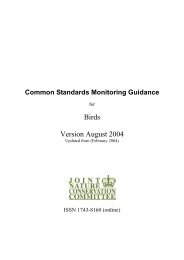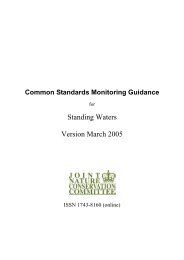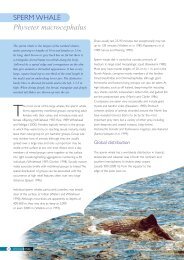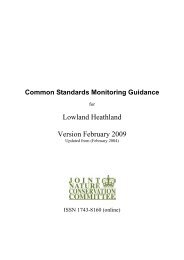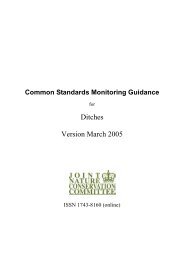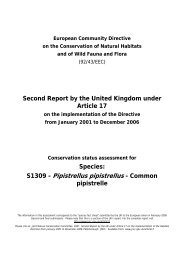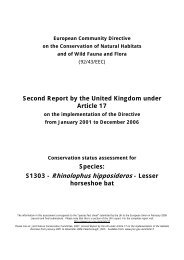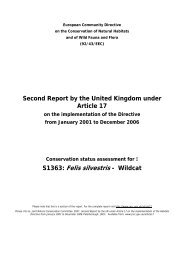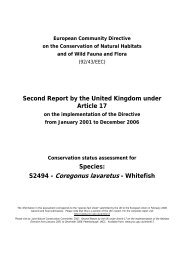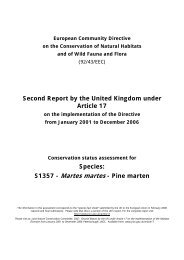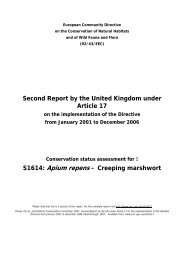UK Climate Change Programme 2006 - JNCC - Defra
UK Climate Change Programme 2006 - JNCC - Defra
UK Climate Change Programme 2006 - JNCC - Defra
Create successful ePaper yourself
Turn your PDF publications into a flip-book with our unique Google optimized e-Paper software.
68<br />
Transport<br />
An example of the fuel economy label, reflecting the recent changes<br />
to VED (note official VCA version not available at time of print)<br />
consumed and on accidents. This work should<br />
deliver increasing carbon savings over time and<br />
help reduce congestion as transport operators<br />
integrate this best practice fully into their<br />
everyday activities. In the meantime, we have<br />
decided to allocate a one off budget increase of<br />
£1.5m to the Safe and Fuel Efficient Driving<br />
scheme (SAFED) which aims both to provide<br />
relevant training and to identify best practice<br />
for truck and van drivers.<br />
34. We are also awaiting a legislative proposal from<br />
the European Commission which is likely to<br />
propose a mandatory system of colour coded<br />
fuel-efficiency labelling across the EU. The <strong>UK</strong><br />
strongly supports this approach, provided that<br />
flexibility is built into the system so that Member<br />
States can ensure compatibility with other<br />
national policy measures.<br />
Logistics<br />
35. In <strong>2006</strong> we will also look at how and<br />
whether to expand the sustainable<br />
distribution programmes to encourage<br />
efficient operating practices in the<br />
haulage/logistics industry through which we<br />
have been able to give practical advice on<br />
how to cut down on lorry mileage, on fuel<br />
36. Using rail instead of road to transport freight can<br />
also cut carbon emissions. The amount of freight<br />
moved by rail in terms of tonne kilometres has<br />
increased by over 55 per cent since 1995/96. The<br />
Government is currently spending around £20m<br />
each year on grants for rail freight, which take<br />
about 800,000 lorry movements off the road<br />
each year.<br />
The Food Industry Sustainability Strategy,<br />
published by <strong>Defra</strong> in April <strong>2006</strong>, challenges<br />
the food and drink industry (manufacturers,<br />
wholesalers, retailers and the food service<br />
sector) to make significant reductions in the<br />
external costs associated with the domestic<br />
transportation of food, including road<br />
congestion and carbon dioxide emissions, by<br />
building upon current best practice and the<br />
logistical improvements of the last decade.<br />
Emissions from food transportation by the food<br />
industry in the <strong>UK</strong> were about 2.6MtC in 2002.<br />
Hydrogen and hybrid buses<br />
The number 25 bus route runs the gamut of London traffic conditions in its journey between Oxford Circus<br />
and Ilford, which makes it a perfect choice for the first hydrogen fuel cell trial bus route. These buses emit<br />
only steam from their tailpipes, because they work by generating electricity from a fuel cell on the vehicle,<br />
in which hydrogen reacts with oxygen from the air to form an electrical charge which powers the vehicle. If<br />
the hydrogen can be produced from carbon-free sources such as renewable electricity, these vehicles could<br />
lead to totally carbon-free transport.<br />
In February <strong>2006</strong>, the Mayor of London announced the addition by Transport for London (TfL) of six new,<br />
environmentally friendly hybrid vehicles - the first ever such vehicles in London - to the London Buses fleet.<br />
The hybrids operate on route 360, run by London Central. A leafy motif on the buses will help passengers<br />
recognise their environmentally-friendly status. They use less fuel than a standard diesel bus, leading to a<br />
substantial reduction in carbon dioxide emissions.



